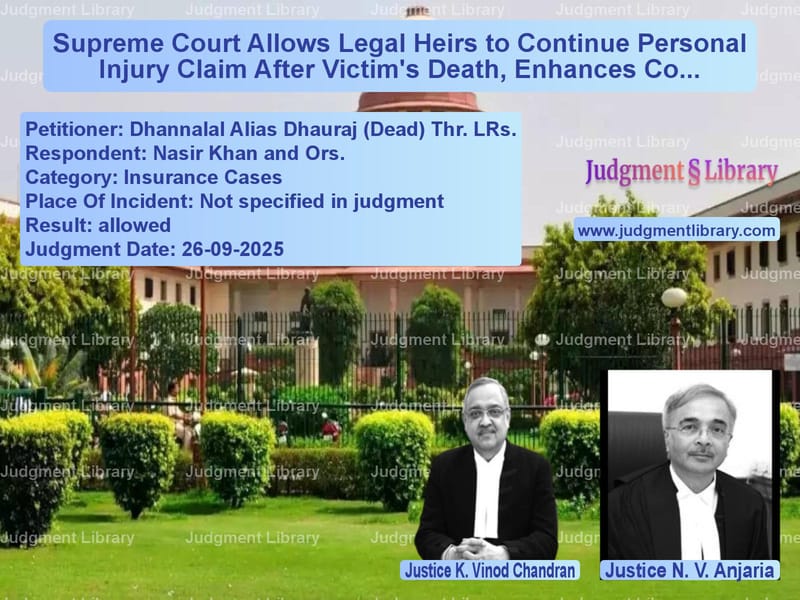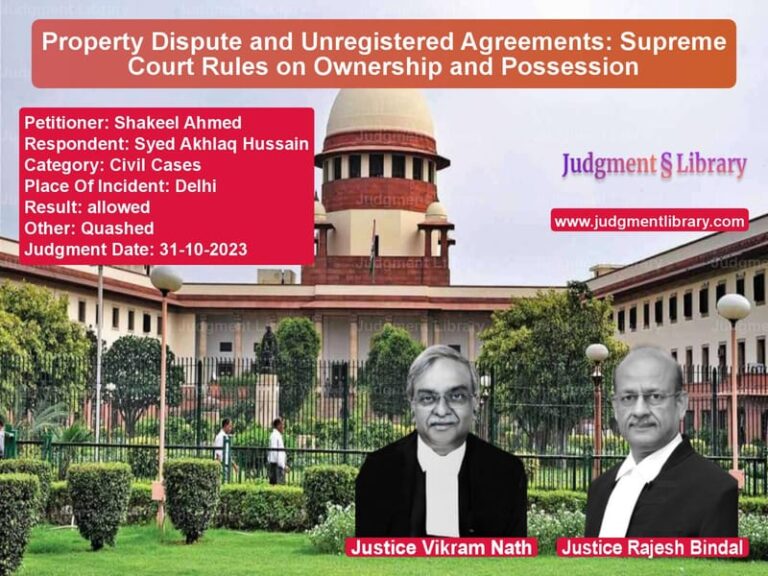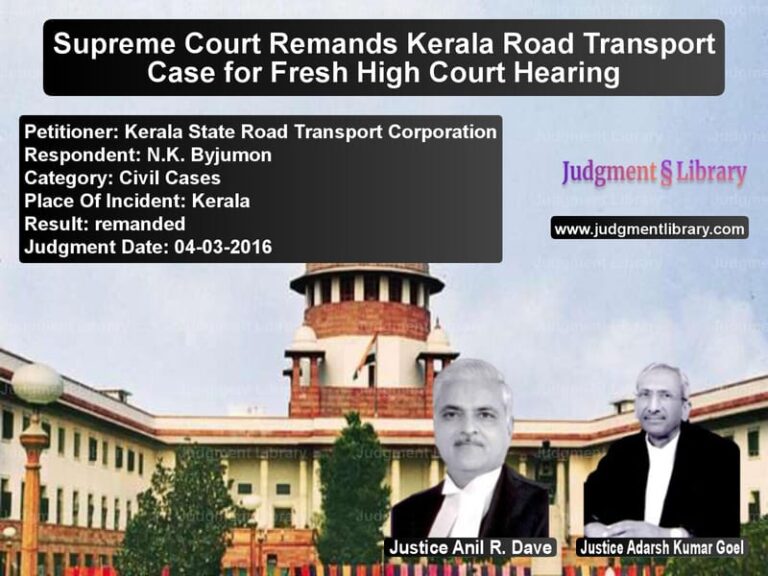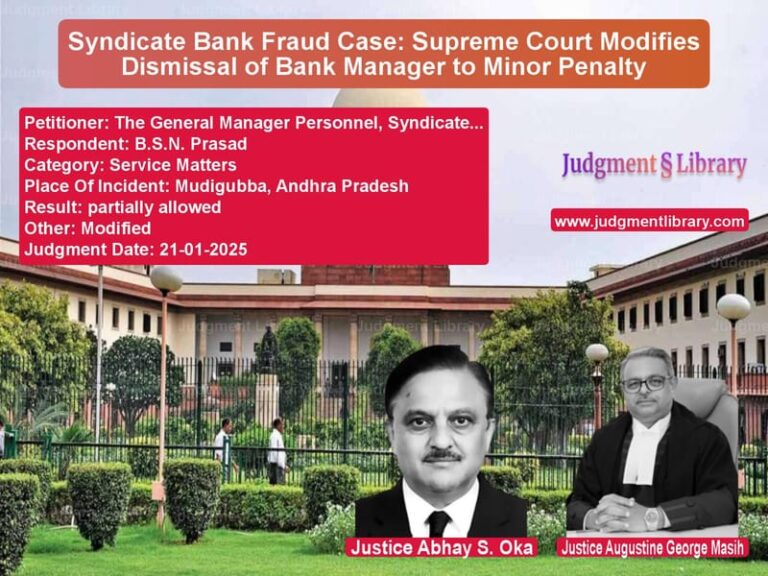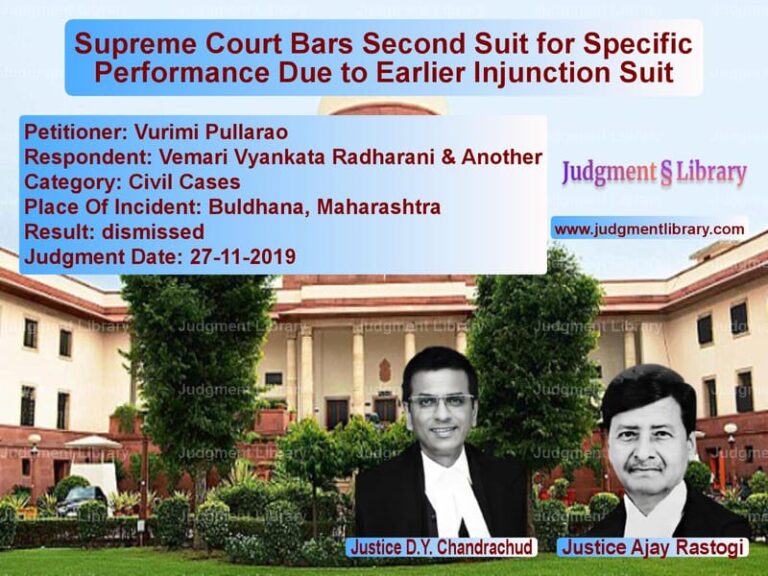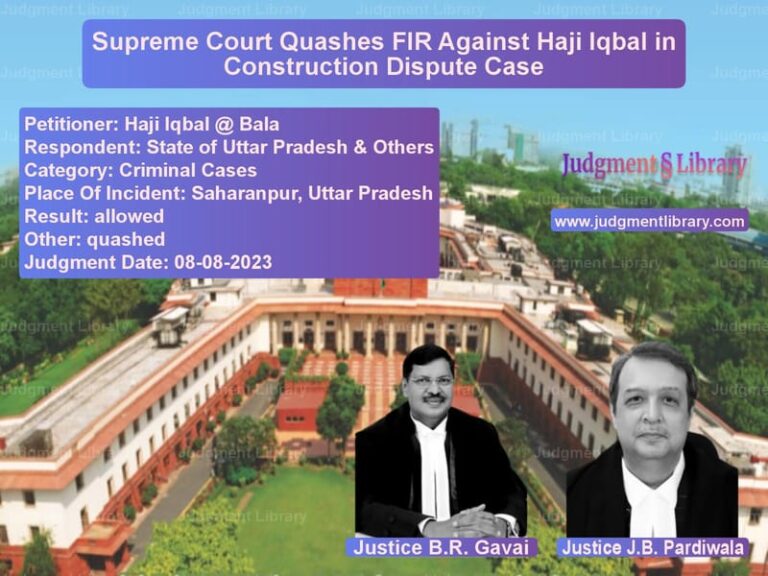Supreme Court Allows Legal Heirs to Continue Personal Injury Claim After Victim’s Death, Enhances Compensation
In a landmark judgment that clarifies the rights of legal heirs in motor accident compensation cases, the Supreme Court has ruled that the legal representatives of a deceased accident victim can continue pursuing a personal injury claim even after the victim’s death. The court also significantly enhanced the compensation amount in a case involving a 100% disabled victim who died during the pendency of legal proceedings.
The Tragic Case and Legal Journey
The case involved Dhannalal, who suffered a devastating motor accident that left him 100% disabled. The original claimant had filed for compensation before the Motor Accidents Claims Tribunal, seeking adequate compensation for his complete loss of earning capacity and the immense suffering caused by the accident. Tragically, during the pendency of the appeal before the Supreme Court, Dhannalal passed away on April 24, 2024, and his legal representatives were substituted to continue the legal battle for enhanced compensation.
The Insurance Company’s Preliminary Objection
The insurance company raised a significant legal challenge against the continuation of the appeal by the legal heirs. The respondent’s counsel contended “that since the claim is of compensation for personal injury, the continuation of the proceedings cannot be permitted by the legal representatives, going by Section 306 of the Indian Succession Act, 1925.”
The insurance company relied on a Full Bench decision of the Madhya Pradesh High Court in Bhagwati Bai and Anr. v. Bablu and Mukund and Ors., which had held “that a claim for personal injury filed under Section 166 of the Motor Vehicles Act, 1988 would abate on the death of the claimant and would not survive to his legal representatives except as regards the claim for pecuniary loss to the estate of the claimant.”
The Supreme Court’s Legal Analysis
The Supreme Court addressed the preliminary objection by examining the legal framework, particularly focusing on the 2019 amendment to the Motor Vehicles Act. The court noted that “the answer is simple and clear in so far as the insertion of sub-section (5) to Section 167 by Act 32 of 2019 with effect from 01.04.2022.”
The court quoted the crucial amendment: “(5) Notwithstanding anything in this Act or any other law for the time being in force, the right of a person to claim compensation for injury in an accident shall, upon the death of a person injured, survive to his legal representatives, irrespective of whether the cause of death is relatable to or had any nexus with the injury or not.”
The court emphasized that “the right to claim compensation for the injuries caused in a motor vehicle accident hence survives on the legal representatives of the injured even if the injured dies in the course of the proceedings for reasons not relatable to or having any nexus with the injuries sustained.”
Precedent and Legal Principles
The Supreme Court also referred to its earlier decisions in Oriental Insurance Company Limited v. Kahlon @ Jasmail Singh Kahlon and Meena (Dead) Rep. by LRs. v. Prayagraj and Others. The court extracted the crucial reasoning from the Meena case: “It was held that if the legal heirs can pursue claims in case of death, there is no reason to prohibit the legal representatives to pursue claims for loss of a property, akin to estate of the injured, if the injured dies subsequently. We see, absolutely no reason to differ from the declaration of law and the insurer also raises no objection on the same.”
The court further elaborated: “We would consider the enhancement sought by the original applicant, which if granted before her death would have accrued to her estate or rather compensated the loss of her estate; caused by reason of the accident, which the legal heirs are entitled to succeed to.”
Quantum of Compensation Enhancement
Having established the legal right of the legal heirs to continue the proceedings, the Supreme Court then addressed the substantive issue of compensation enhancement. The case had a complex history where the Tribunal initially granted Rs. 18,82,000 with 9% interest, determining the monthly income at Rs. 8,000. However, on remand, the Tribunal reduced the monthly income to Rs. 4,030 without reasonable cause.
The Supreme Court conducted a detailed analysis of the income assessment, referring to its earlier decision in Ramachandrappa v. Manager, Royal Sundaram Alliance Insurance Company Limited, where “this Court held a Coolie to be entitled to Rs.4500/- as monthly income in 2004.” The court reasoned that “definitely there would be incremental increase of income in the succeeding years which we determine at Rs.500/- per year which would bring the total income so computed to Rs.9,000/- as on 2013.”
The court further noted that “considering the fact that the injured was engaged as a skilled worker for which oral evidence was adduced, we are of the opinion that Rs.9,000/- can be safely accepted as his monthly income at the time of the accident, which he was deprived of fully because of the 100% disability.”
Multiplier Calculation and Future Prospects
The Supreme Court made a significant adjustment in the multiplier calculation, considering that the victim lived only for 11 years after the accident. The court observed that “the multiplier is applied on the assessment of the normal life span where an injured or deceased in a motor accident would have worked and earned to support himself and his family.”
The court reasoned: “When the consideration in the present appeal, is with respect to the loss occasioned to the estate of the injured; the injured having died, the multiplier adopted of 14 cannot be applied which will have to be reduced to 11, the actual life span.”
However, the court also recognized the victim’s right to future prospects, stating: “The victim not being engaged in a regular employment still is entitled to 25% for future prospects especially since his functional disability was 100%, totally disabled from carrying on any work or generate any income.”
Final Compensation Calculation
The Supreme Court adopted a comprehensive approach to compensation calculation, considering both the loss of income and other expenses. The court noted that “the award of the Tribunal as modified and enhanced by the High Court determined a total award of Rs.5,52,095/- as computed under mental agony, pain and suffering, nourishment, transportation and medical expenses, incurred and future, as also expenses for a personal attendant which has to be sustained, since the injured had lived for 11 years after the accident, in a vegetative state. That has already become a part of the estate of the injured-victim.”
For the loss of income, the court applied the formula: “Rs.9,000 x 12 x 125% x 11 = Rs.14,85,000/–.” The total compensation was thus enhanced to Rs. 20,37,095.
Interest Payment Directive
The Supreme Court also addressed the issue of interest, noting that “one another contention raised is with respect to the restriction of the interest paid i.e., from the date of application till 07.11.2016 as restricted by the High Court without any rationale.”
The court directed that “the interest on the total award of Rs.20,30,095/- at the rate of 9% would run from the date of the filing of the claim petition till the payment is made.” The court further ordered that “if any amounts are already paid, the same shall be deducted and the balance shall be paid within a period of three months from the date of this judgment.”
Legal Significance and Impact
This judgment has far-reaching implications for motor accident compensation jurisprudence in India. By upholding the rights of legal heirs to continue personal injury claims, the Supreme Court has ensured that accident victims and their families are not deprived of just compensation due to procedural technicalities or the unfortunate death of the victim during legal proceedings.
The court’s interpretation of the 2019 amendment to Section 167 of the Motor Vehicles Act provides clarity and certainty to this area of law, ensuring that legal heirs can pursue compensation claims regardless of whether the victim’s death is directly related to the accident injuries.
The judgment also demonstrates the court’s commitment to ensuring “just compensation” that truly reflects the loss suffered by accident victims and their families. By enhancing the compensation amount and providing clear guidelines for income assessment and multiplier application, the court has set important precedents for future cases involving severe disabilities and subsequent death of victims.
The Supreme Court’s comprehensive approach to compensation calculation, considering both economic and non-economic losses, reflects the evolving jurisprudence in motor accident claims that aims to provide meaningful relief to victims and their families while maintaining the principle that compensation should not become a windfall.
Petitioner Name: Dhannalal Alias Dhauraj (Dead) Thr. LRs..Respondent Name: Nasir Khan and Ors..Judgment By: Justice K. Vinod Chandran, Justice N. V. Anjaria.Place Of Incident: Not specified in judgment.Judgment Date: 26-09-2025.Result: allowed.
Don’t miss out on the full details! Download the complete judgment in PDF format below and gain valuable insights instantly!
Download Judgment: dhannalal-alias-dhau-vs-nasir-khan-and-ors.-supreme-court-of-india-judgment-dated-26-09-2025.pdf
Directly Download Judgment: Directly download this Judgment
See all petitions in Motor Insurance Settlements
See all petitions in Third-Party Insurance
See all petitions in Insurance Settlements
See all petitions in Other Insurance Cases
See all petitions in Compensation Disputes
See all petitions in Judgment by K. Vinod Chandran
See all petitions in Judgment by N.V. Anjaria
See all petitions in allowed
See all petitions in supreme court of India judgments September 2025
See all petitions in 2025 judgments
See all posts in Insurance Cases Category
See all allowed petitions in Insurance Cases Category
See all Dismissed petitions in Insurance Cases Category
See all partially allowed petitions in Insurance Cases Category

